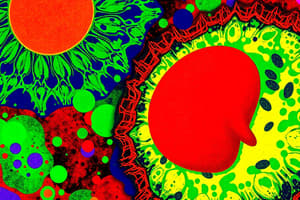Podcast
Questions and Answers
Which organelle is responsible for producing ATP, the energy currency of the cell?
Which organelle is responsible for producing ATP, the energy currency of the cell?
- Mitochondria (correct)
- Golgi apparatus
- Ribosomes
- Nucleus
What is the main function of the endoplasmic reticulum in a cell?
What is the main function of the endoplasmic reticulum in a cell?
- Protein synthesis (correct)
- Energy production
- Lipid storage
- Cell detoxification
Which organelle contains digestive enzymes and breaks down cellular waste and foreign substances?
Which organelle contains digestive enzymes and breaks down cellular waste and foreign substances?
- Vacuoles
- Mitochondria
- Ribosomes
- Lysosomes (correct)
What is one of the key functions of cells that involves converting nutrients into energy and essential molecules?
What is one of the key functions of cells that involves converting nutrients into energy and essential molecules?
How do cells communicate with each other to coordinate their activities and maintain a healthy balance within the organism?
How do cells communicate with each other to coordinate their activities and maintain a healthy balance within the organism?
What is the main focus of cell biology?
What is the main focus of cell biology?
Which types of cells lack a nucleus and other membrane-bound organelles?
Which types of cells lack a nucleus and other membrane-bound organelles?
What distinguishes eukaryotic cells from prokaryotic cells?
What distinguishes eukaryotic cells from prokaryotic cells?
Which statement is true about prokaryotic cells?
Which statement is true about prokaryotic cells?
What is the fundamental unit of life?
What is the fundamental unit of life?
Study Notes
Biology: The Study of Life
Biology is the scientific study of living organisms and their interactions with the environment. It is a vast and diverse field, encompassing a wide range of subdisciplines, including cell biology, genetics, ecology, and evolution. In this article, we will focus on cell biology, which is the study of the structure, function, and behavior of cells, the fundamental unit of life.
Cell Biology: The Building Blocks of Life
Cell biology is a branch of biology that deals with the study of cells, their structure, function, and behavior. Cells are the basic unit of life, and they are responsible for carrying out all the functions necessary for the survival of an organism. There are two main types of cells: prokaryotic and eukaryotic.
Prokaryotic cells are simpler in structure and lack a nucleus and other membrane-bound organelles. They are typically smaller in size and are found in bacteria and archaea. Eukaryotic cells, on the other hand, are more complex in structure and have a nucleus and other membrane-bound organelles. They are found in plants, animals, and fungi.
The Structure of Cells
The structure of a cell is highly organized and complex, with various organelles performing specific functions. The main organelles found in eukaryotic cells include:
- Nucleus: This is the control center of the cell, containing the DNA that carries the genetic instructions for the cell.
- Mitochondria: These are the powerhouses of the cell, responsible for producing ATP, the energy currency of the cell.
- Ribosomes: These are the site of protein synthesis, where the genetic information in the DNA is translated into a sequence of amino acids to form a protein.
- Endoplasmic reticulum: This is a network of tubules that plays a role in the synthesis, modification, and transport of proteins and lipids.
- Golgi apparatus: This organelle modifies, sorts, and packages proteins and lipids for transport to their final destination in the cell.
- Lysosomes: These are membrane-bound organelles that contain digestive enzymes and break down cellular waste and foreign substances.
- Vacuoles: These are membrane-bound sacs that store water, nutrients, and waste products in the cell.
The Function of Cells
Cells carry out a wide range of functions necessary for the survival of an organism. Some of the key functions of cells include:
- Metabolism: Cells convert nutrients into energy and other essential molecules for the cell.
- Growth and reproduction: Cells grow and divide to produce new cells, which is essential for the growth and development of an organism.
- Response to stimuli: Cells sense and respond to changes in their environment, allowing them to adapt to changing conditions.
- Detoxification: Cells contain organelles that help to detoxify the cell by breaking down harmful substances.
- Communication: Cells communicate with each other using chemical signals, allowing them to coordinate their activities and maintain a healthy balance within the organism.
The Significance of Cell Biology
Cell biology is a fundamental area of biology that has significant implications for our understanding of health and disease. Many diseases, such as cancer and genetic disorders, are caused by changes in the structure or function of cells. By studying the structure and function of cells, cell biologists can gain insights into the causes of these diseases and develop new treatments and therapies.
In addition, cell biology has practical applications in fields such as biotechnology and biomedical engineering. For example, cell biology has played a key role in the development of new drugs and vaccines, as well as in the production of biofuels and other industrial products.
Conclusion
Cell biology is a fascinating and important area of biology that has significant implications for our understanding of life and health. By studying the structure and function of cells, we can gain insights into the causes of disease and develop new treatments and therapies. As our knowledge of cell biology continues to grow, we can expect to see many exciting developments in this field in the future.
Studying That Suits You
Use AI to generate personalized quizzes and flashcards to suit your learning preferences.
Description
Test your knowledge of cell biology with this quiz on the structure, function, and significance of cells, the fundamental unit of life. Explore the intricacies of cell organelles, cellular functions, and the significance of cell biology in health and disease.




